Your microwave is hot when not in use because
- There is not enough space around the microwave
- Overheating from overuse
- Steam generated from cooked food
- The control board is malfunctioning
- The fan has stopped working
- Magnetron is malfunctioning.
Well, that’s the short version. There is more to find out about why your microwave is hot when not in use. To learn how to solve the issues and take preventive measures continue reading the article.
Table of Contents
Key Takeaways
- Microwave gets hot when there’s not enough space around it. Try to give it enough breathing room.
- Overusing the microwave can lead to overheating. Take short breaks in between cooking.
- A faulty control board may be responsible for overheating. Follow these steps to replace it.
- A malfunctioning fan or magnetron can be a reason for overheating. In such cases, call for professional help.
Why Is the Microwave Hot When Not In Use?
Discovering that your microwave is hot even though you haven’t used it is a common occurrence. Several matters can contribute to this issue.
In this article, we will provide reasons and solutions for those for matters. But before doing that let’s find out how hot is too hot for a microwave.
How Hot Should a Microwave Get?
Based on how long the microwave is running, the walls of it can become slightly warm to very hot. It’s normal if you feel warmth an inch or two away from the surface of the microwave.
However, if it’s too hot to keep your hand on the surface, there is a serious issue with your microwave.
Overheating can cause dangerous problems like melting or fires. Also, using an overheated microwave might damage its internal parts. So, make sure you identify the reason behind the overheating and take appropriate action.
The following table gives a brief overview of the possible reasons your microwave gets hot when not in use. Also, it gives you quick fixes to apply when that happens.
| Reasons | Solutions |
| Not Enough Space Around the Microwave | Give the microwave enough space |
| Overheating Due to Overuse | Give the microwave a break or replace it |
| Cooking Food That Generates a Lot of Steam | Take breaks and leave the microwave’s door open |
| Faulty Control Board | Clean or replace the board |
| Fan Isn’t Working Properly | Take professional help |
| Magnetron Is Malfunctioning | Contact a professional |
However, there’s more to it. To know details about each reason and solution, read along. We have carefully analyzed the issues and explained the solutions in detail.
Reason 1: Not Enough Space Around the Microwave
The first possible explanation for a microwave getting hot is when it is placed in a tight space. Heat can be trapped if there’s not adequate space for air to move freely. As a result, it gets hot even when it is not in use.
Additionally, if the microwave’s vents are blocked somehow, it can’t release heat properly. This happens if you put something on top of your microwave or if dust clogs the vents. By trapping heat inside, the outside becomes hot.
Solution:
To remedy this, you might need to change things around the microwave. Move anything that’s blocking the air. Then, make sure there are a few inches of space on all sides. This lets the air move around your appliance and prevents overheating.
Also, regularly clean your microwave to prevent dust buildup. It will keep your microwave running efficiently for a long time.
In small kitchens, you might have to settle for a permanent solution. You can make a cabinet or put up a shelf to give the microwave more space.
Reason 2: Overheating Due to Overuse
Another possible reason your microwave gets hot even when not in use is because it’s been used a lot. As microwaves get older, their internal components wear out. This results in less efficiency and overheating.
Solution
If this happens, you might think about getting a new microwave. That way, you can make sure it cooks properly.
| Product Name | Features |
| TOSHIBA Countertop Microwave Ovens | Smart humidity sensorEco modePractical control panel |
| Panasonic Microwave Oven | Turbo defrostCompact designSmart cooking settings |
If you don’t want to get a new one, give it enough break while cooking foods.
Reason 3: Cooking Food That Generates a Lot of Steam
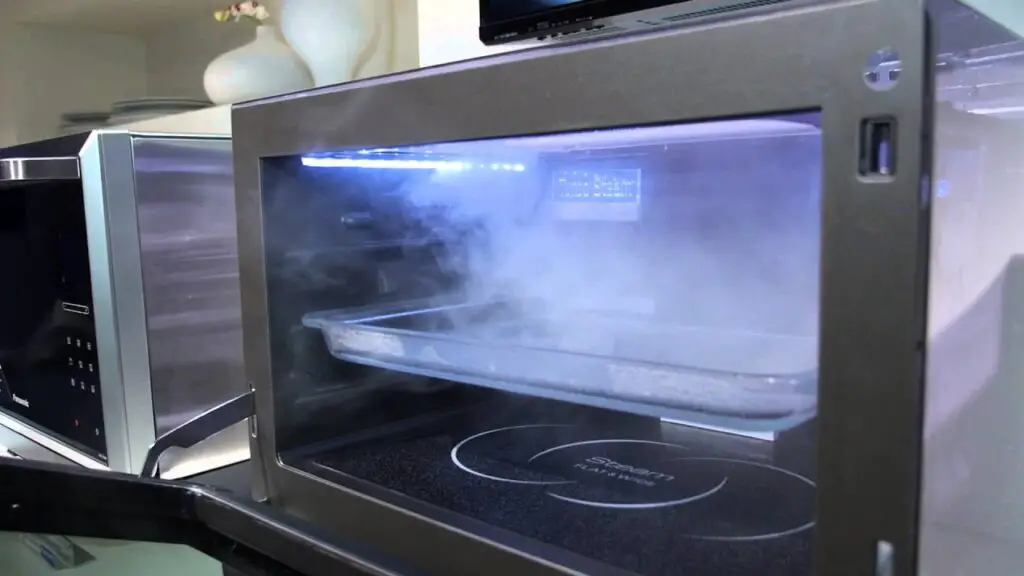
One common reason behind microwave overheating is cooking foods that can lead to a lot of steam. Steam naturally leads to heat and the microwave’s internal components can absorb it.
In addition, foods with low moisture can cause the microwave to become too hot if heated for too long.
Newer microwaves have safety features, but it’s wise to be cautious about cooking times and food choices to avoid overheating. Speaking of food choices, learn the secret of cooking brown and white rice together to make an informed decision.
Solution
In this regard, the solution is straightforward. You just give your microwave a break. Also, keep its door open, so that the excess heat goes away. Make sure to keep a good ventilation system in your kitchen.
Reason 4: Faulty Control Board
Another reason your microwave is overheating is when the control board is not working properly. And, it is keeping some of the buttons pressed. So, the appliance is running even when not in use.
Luckily, control board problems are common and usually easy to fix.
Solution
Your first task is to clean the control board properly. In case that doesn’t work, you can replace the board by following these steps:
- Unplug your microwave.
- Take out the side vent from the microwave.
- Unscrew the control board. Usually, there’s just one screw.
- Install the new control board. After that put the microwave back together.
In case, you want a practical guide, you can check out this helpful video.
Knowing how to deal with microwave issues yourself goes a long way. For instance, learning the steps of enabling silent mode on the Hamilton Beach microwave should make your kitchen life easier.
Reason 5: Fan Isn’t Working Properly
A lot of microwaves have a fan that cools down the inside after usage. If the fan doesn’t work well or stops, the microwave can get too hot to touch.
This usually happens when the fan is blocked or the motor is broken.
Solution
For this matter, try to troubleshoot any possible issues with your fan. Follow these easy steps:
- Unplug the microwave for safety before starting any work.
- Remove the guard and unscrew the panel covering the back of the control area.
- Test the fan by manually spinning it; trace the wires to the source.
- Locate the relay connected to the fan wires and tap it around 10-15 times.
- Reattach any disconnected cables, ensuring a secure fit.
- Plug in the microwave, and turn it on to test the fan.
- Reassemble the panel and guard.
For an easy-to-follow tutorial, go through this helpful video.
However, if you’re unsure about repairs, the you should call for professional help. They will carefully inspect the condition and give you appropriate guidance. The servicing charge ranges from $75 to $200.
Reason 6: Magnetron Is Malfunctioning
A hot Magnetron is another possible reason why your microwave is hot when not in use. The Magnetron is an integral part of a microwave. The appliance is not able to heat food without it.
For that reason, if it’s failing or working too hard, it can overheat and cause problems.
Solution
A microwave with a faulty Magnetron is unsafe to use. When this problem occurs, it’s wise to have a professional inspect it. To replace a microwave magnetron, it will cost you between $100 and $200 on average.
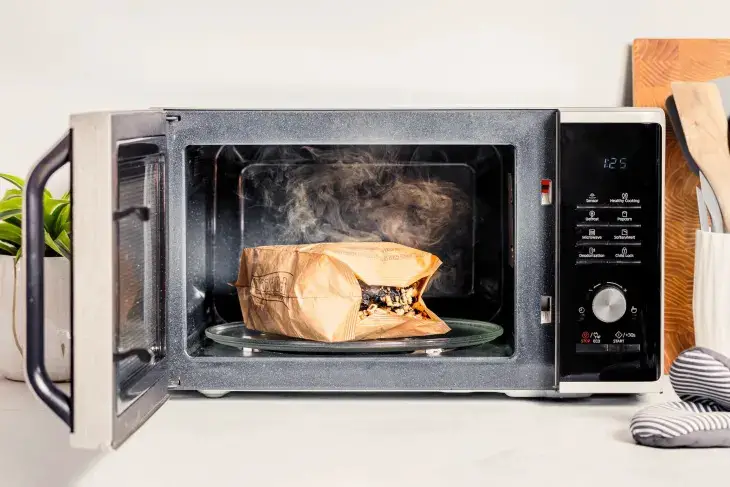
Signs That Your Microwave Is Going Bad
Your microwave is going bad if you see one of these signs:
- Smoke, sparks, or burning smells coming out of your microwave. Immediately turn off and unplug the microwave. Replacement is a must.
- Food is slowly cooked or not cooked at all. Test with water. If it doesn’t get hot, a new microwave might be needed.
- Unusual noise comes out while cooking. Check the turntable and fan first, then consider a replacement.
- Cracks or damage in the sealed door. The sealed door is crucial for safety. So, a new microwave might be needed.
- Non-responsive keypad. Clean it properly. But if problems persist, a replacement might be in order.
- Microwave older than 10 years. Even if it is functioning, you should consider an upgrade for improved technology.
How to Prevent A Microwave From Getting Hot When Not in Use
Choose a Well-Ventilated Spot in the Kitchen:
First, place your microwave in a suitable location. It can be in the kitchen which allows proper airflow.
Many manufacturers recommend leaving at least four inches of space around the oven sides. And eight inches from the microwave top to the nearest surface.
Avoid placing objects on top of the microwave. Also, ensure that the vents are clear and it’s not set tightly against the wall.
Keep Distance from Stovetops or Ovens:
Avoid placing the microwave right next to a stovetop or oven. The heat from the burners can cause the microwave’s exterior to become hot. Also, using both appliances simultaneously may lead to microwave overheating.
Adjust Power Settings:
To minimize external heat, lower the microwave’s power settings. Decreasing the cooking temperature for certain foods can reduce the heat transferred to the microwave’s exterior.
Research the ideal temperature for different foods. For example, thicker foods, like meats, often require longer cooking times at lower temperatures.
Take Short Intervals:
Take intervals in between cooking to prevent excessive external heat. Reheat a bowl of soup in shorter intervals (30-60 seconds) and stir between them instead of two minutes straight.
This approach is particularly useful for preventing overheating during the heating process.
Frequently Asked Questions (FAQs):
How Long Do Microwaves Last?
A microwave typically lasts around 7 to 8 years under normal usage. However, the number may vary based on the usage. For example, if the microwave is used less frequently, and well-maintained, it can perform up to 10 years.
How Long Does A Microwave Magnetron Last?
Microwave magnetrons have a lifespan of around 2000 hours. Lower-quality magnetrons might not last as long. If your microwave isn’t heating food correctly, chances are the magnetron has stopped working.
Can You Run A Microwave For 30 Minutes?
Yes, you can run a microwave for 30 minutes. As long as there’s food inside the appliance, it’s fine to keep it running for this long. However, make sure you are following proper cooking methods.
Conclusion
Now you know the reasons why your microwave is hot when not in use. Factors such as overuse, faulty control board, or malfunctioning magnetron contribute to the problem. However, you have nothing to worry about because you can easily solve these issues by carefully following our guide.

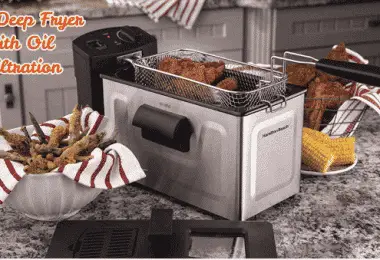





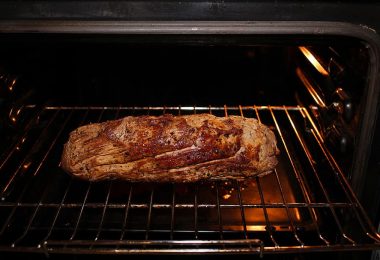

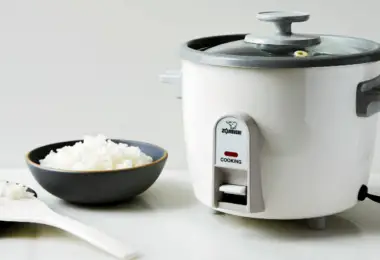
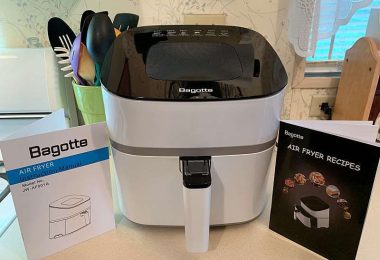


Leave a Comment